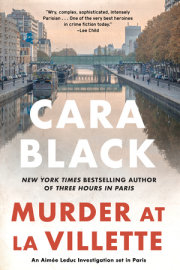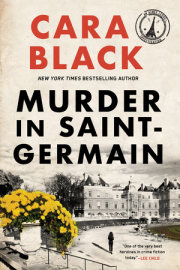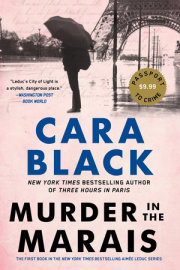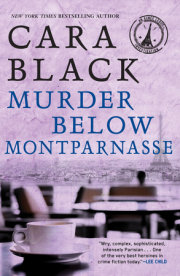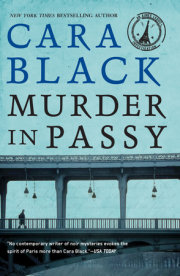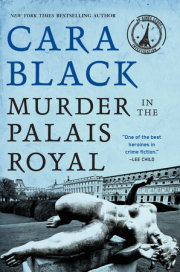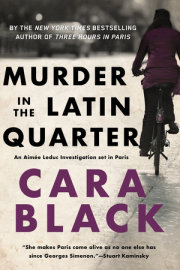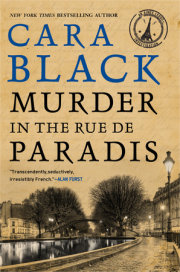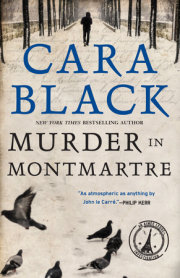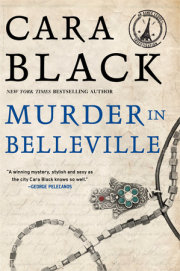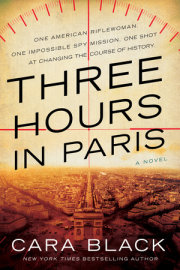A confession fifty years in the making puts everyone’s favorite Paris détéctive très chic, Aimée Leduc, on a collision course with the “Hand,” a cabal of corrupt Parisian cops among who masterminded her father's murder—and among whose ranks he might have once found membership. When a friend’s child is kidnapped while wearing her daughter’s hoodie, Aimée realizes that the case has crossed into the realm of the personal in more ways than one.
A dying man drags his oxygen machine into the office of Éric Besson, a lawyer in Paris’s 13th arrondissement. The old man, an accountant, is carrying a dilapidated notebook full of meticulous investment records. For decades, he has been helping a cadre of dirty cops launder stolen money. The notebook contains his full confession—he’s waited 50 years to make it, and now it can’t wait another day. He is adamant that Besson get the notebook into the hands of La Proc, Paris’s chief prosecuting attorney, so the corruption can finally be brought to light. But en route to La Proc, Besson’s courier—his assistant and nephew—is murdered, and the notebook disappears.
Grief-stricken Éric Besson tries to hire private investigator Aimée Leduc to find the notebook, but she is reluctant to get involved. Her father was a cop and was murdered by the same dirty syndicate the notebook implicates. She’s not sure which she’s more afraid of, the dangerous men who would kill for the notebook or the idea that her father’s name might be among the dirty cops listed within it. Ultimately that’s the reason she must take the case, which leads her across the Left Bank, from the Cambodian enclave of Khmer Rouge refugees to the ancient royal tapestry factories to the modern art galleries.
A dying man drags his oxygen machine into the office of Éric Besson, a lawyer in Paris’s 13th arrondissement. The old man, an accountant, is carrying a dilapidated notebook full of meticulous investment records. For decades, he has been helping a cadre of dirty cops launder stolen money. The notebook contains his full confession—he’s waited 50 years to make it, and now it can’t wait another day. He is adamant that Besson get the notebook into the hands of La Proc, Paris’s chief prosecuting attorney, so the corruption can finally be brought to light. But en route to La Proc, Besson’s courier—his assistant and nephew—is murdered, and the notebook disappears.
Grief-stricken Éric Besson tries to hire private investigator Aimée Leduc to find the notebook, but she is reluctant to get involved. Her father was a cop and was murdered by the same dirty syndicate the notebook implicates. She’s not sure which she’s more afraid of, the dangerous men who would kill for the notebook or the idea that her father’s name might be among the dirty cops listed within it. Ultimately that’s the reason she must take the case, which leads her across the Left Bank, from the Cambodian enclave of Khmer Rouge refugees to the ancient royal tapestry factories to the modern art galleries.
Praise for Murder on the Left Bank
"Even after 17 books, Ms. Black has intriguing corners of Paris to reveal—from an enclave of ateliers once home to the likes of Gauguin and Rodin to a crime-ridden neighborhood where 'no one wanted to be witnessed witnessing.'"
—Tom Nolan, The Wall Street Journal
"One of [Black's] strongest mysteries . . . But the real joy of Murder on the Left Bank is in its familiar cast and its thoughtful, witty, occasionally melancholy evocation of Paris, the city where we keep so many of our most beautiful ideas about what life might mean."
—Charles Finch, USA Today
"Cara Black’s Aimée Leduc is a gem: a stylish, brave private detective (and new mom) who zips around Paris on a scooter . . . Black treats us to another of her beguiling tours of some of Paris’ little-known corners."
—Adam Woog, The Seattle Times
"Marvelous . . . Murder on the Left Bank boasts all of Black's trademark charms, including deft plotting, sharp dialog and colorful sights and sounds."
—Chicago Tribune
"Since 1998’s Murder in the Marais, I have looked forward to each new installment of Cara Black’s series featuring Paris-based private investigator Aimée Leduc. I’ve read them all, and there isn’t a clinker in the lot."
—Bruce Tierney, BookPage
"The atmospheric stories are so well-written that they make the reader believe they are in Paris."
—Deadly Pleasures Magazine
"Cara Black takes the classic ingredients of the genre and puts a new Gallic spin on them. The finest PI series now being written."
—Mick Herron, author of This Is What Happened and the Slough House series
“Always entertaining . . . This well-crafted mystery is set on Paris’s Left Bank, though not the chic environs of the fifth through seventh arrondissements; one of Black’s strengths is showing us the grittier, everyday Paris.”
—Library Journal
"Gratifyingly full of local Parisian color."
—Kirkus Reviews
"Particularly poignant."
—Booklist
"A quintessential author of crime fiction set in Paris . . . Not to be missed for readers of exacting heroines, and the crooked villains hiding along Paris’ picturesque boulevards."
—Elle Marr, Criminal Element
"A thrilling adventure, filled with colorful characters that will keep you turning the pages until the exciting finale."
—Fresh Fiction
"Black's plotting is intense and acutely paced, with twists in each chapter and a smooth and powerful narrative that sweeps through the book."
—Kingdom Books
Praise for Murder in Saint-Germain
A Los Angeles Times National Bestseller
A BBC Best Summer Read of 2017
“The abiding pleasure of this series is the chance to ride with a cabdriver who wants to discuss Sartre or just tearing around Paris on Aimée’s pink Vespa, making stops at the Jardin du Luxembourg and the Île Saint-Louis, where Aimée has an apartment. Lucky girl.”
—The New York Times Book Review
“An atmospheric thriller with a savvy take on international arms dealing.”
—BBC's Between the Lines
“The pace is, as ever, lickety-split, the sleuthing complex and the small pauses to savour Saint-Germain’s glories delightfully educational.”
—The Toronto Star
“Black's detective is hitting her post-pregnancy stride, bringing up bébé while battling the bad guys with the best of them.”
—Kirkus Reviews
"Even after 17 books, Ms. Black has intriguing corners of Paris to reveal—from an enclave of ateliers once home to the likes of Gauguin and Rodin to a crime-ridden neighborhood where 'no one wanted to be witnessed witnessing.'"
—Tom Nolan, The Wall Street Journal
"One of [Black's] strongest mysteries . . . But the real joy of Murder on the Left Bank is in its familiar cast and its thoughtful, witty, occasionally melancholy evocation of Paris, the city where we keep so many of our most beautiful ideas about what life might mean."
—Charles Finch, USA Today
"Cara Black’s Aimée Leduc is a gem: a stylish, brave private detective (and new mom) who zips around Paris on a scooter . . . Black treats us to another of her beguiling tours of some of Paris’ little-known corners."
—Adam Woog, The Seattle Times
"Marvelous . . . Murder on the Left Bank boasts all of Black's trademark charms, including deft plotting, sharp dialog and colorful sights and sounds."
—Chicago Tribune
"Since 1998’s Murder in the Marais, I have looked forward to each new installment of Cara Black’s series featuring Paris-based private investigator Aimée Leduc. I’ve read them all, and there isn’t a clinker in the lot."
—Bruce Tierney, BookPage
"The atmospheric stories are so well-written that they make the reader believe they are in Paris."
—Deadly Pleasures Magazine
"Cara Black takes the classic ingredients of the genre and puts a new Gallic spin on them. The finest PI series now being written."
—Mick Herron, author of This Is What Happened and the Slough House series
“Always entertaining . . . This well-crafted mystery is set on Paris’s Left Bank, though not the chic environs of the fifth through seventh arrondissements; one of Black’s strengths is showing us the grittier, everyday Paris.”
—Library Journal
"Gratifyingly full of local Parisian color."
—Kirkus Reviews
"Particularly poignant."
—Booklist
"A quintessential author of crime fiction set in Paris . . . Not to be missed for readers of exacting heroines, and the crooked villains hiding along Paris’ picturesque boulevards."
—Elle Marr, Criminal Element
"A thrilling adventure, filled with colorful characters that will keep you turning the pages until the exciting finale."
—Fresh Fiction
"Black's plotting is intense and acutely paced, with twists in each chapter and a smooth and powerful narrative that sweeps through the book."
—Kingdom Books
Praise for Murder in Saint-Germain
A Los Angeles Times National Bestseller
A BBC Best Summer Read of 2017
“The abiding pleasure of this series is the chance to ride with a cabdriver who wants to discuss Sartre or just tearing around Paris on Aimée’s pink Vespa, making stops at the Jardin du Luxembourg and the Île Saint-Louis, where Aimée has an apartment. Lucky girl.”
—The New York Times Book Review
“An atmospheric thriller with a savvy take on international arms dealing.”
—BBC's Between the Lines
“The pace is, as ever, lickety-split, the sleuthing complex and the small pauses to savour Saint-Germain’s glories delightfully educational.”
—The Toronto Star
“Black's detective is hitting her post-pregnancy stride, bringing up bébé while battling the bad guys with the best of them.”
—Kirkus Reviews
Paris • Early September 1999 • Friday
Pale afternoon light filtered into Éric Besson’s wood-paneled office as Monsieur Solomon untied the twine that bound together a bulging old notebook.
“We were prisoners together in a POW camp,” Solomon said, wheezing, as the lawyer took hurried notes. “Stalag III-C, east of Berlin. Pierre saved my life.” Another wheeze. “You understand why I did what I did.”
Besson capped his pen. The effort of talking had cost Monsieur Solomon, who was in his eighties, and he reached for his oxygen mask. After several labored inhales, he grabbed Besson’s arm with a crab-claw grip. “But Pierre’s gone now,” Solomon said. “It’s all written in there: my confession, the amounts, dates. Years of entries.”
Besson reached across his desk to take the notebook from the old man’s shaking hands. He opened the well-worn volume to see columns of names and numbers, an accountant’s tiny, perfect handwriting. He turned page after page, his eyes catching on names and franc amounts as it gradually dawned on him what he must be looking at.
Monsieur Solomon’s rheumy brown eyes bored into the lawyer. “I’m dying. Get this to the right person.”
Besson reached for his briefcase. “Tomorrow, first thing, I promise.”
“Non, you must do it now.”
A real pain, the old geezer. He’d waited fifty years to do the right thing, and now he couldn’t wait one more day. “Alors, I’ll keep your notebook in my safe. You don’t have to worry—”
“Now,” Monsieur Solomon interrupted. “This can’t wait. I won’t leave until you send a note to la Procureure de la République.”
The old coot had barged into Éric Besson’s office without an appointment—as well as anyone could barge with an oxygen machine. “My secretary’s left already. I literally should be in court right now . . .”
Monsieur Solomon pointed a knobby arthritic finger toward the adjoining room. “Get that boy there, your helper. You trust him?”
“He’s family, but—”
The old man stomped his shriveled leg. “If you can’t trust family, then who? Send him.”
Another bout of wheezing.
Worried that the old man would be carried out of his office on a stretcher—or worse, in a box—Besson stepped into the adjoining office, where Marcus was assembling a new chair. Marcus was Éric’s sister’s boy, a gangling, baby-faced eighteen-year-old with curly hair and the beginnings of a beard.
“Here’s another job for you, Marcus,” Besson said. “I need you to run this to la Proc.”
“But I’ve got plans with Karine. A date.”
Besson reached in his pocket for a wad of francs. “Do this, okay?”
Marcus glanced at his cell phone. “How long will it take?”
“Back and forth in a taxi, twenty minutes, that’s all.”
Besson shoved the old man’s twine-bound notebook, its handwritten pages spilling out, into a plastic Monoprix shopping bag, knotted the plastic handles together, and zipped the sack into Marcus’s backpack. “Go right away.”
“Why can’t it be tomorrow?”
Besson lowered his voice to a whisper. “Please, it’s important, Marcus.”
“Who is this old fart?”
“A friend of my mother’s. Long story.” The door buzzer sounded. Besson’s colleague had arrived to pick him up for court in Meudon. “Marcus, just get this to la Proc. Tell her I sent you. Don’t talk to anyone else. Don’t meet anyone on the way except a taxi driver at the stand on the corner. Comprends?”
Marcus, perspiring, loosened his collar as he shut his uncle’s door and scanned Boulevard Arago. In the humid afternoon, a woman walked her schnauzer; a car radio blared news into the velvet air. No taxi at the stand.
Et voilà, Marcus would pocket the taxi fare and catch the bus. His uncle would never know. Marcus turned onto narrow rue Pascal and hurried through the dim tunnel created by the street that passed above it a block later. The tunnel echoed with his footsteps and with the rumbling of the cars passing overhead. The old notebook heavy in his backpack, he headed up the stairs to Boulevard de Port-Royal. Marcus was almost at the bus stop. He savored the thought of the money in his pocket.
His cell phone vibrated. His uncle. He ignored it.
Marcus scanned the sidewalk. Karine was standing near the bus stop and waved. Another call from his uncle. He ignored this one, too.
“You’re late.” A big pout on her red lips. He eyed her lace camisole top and hip-hugging jeans. “My friend’s letting us use her place, remember?”
Marcus pulled her close. “We’re going to a hotel. No attic room with bedbugs in the mattress today.”
Karine shook her head. “On your allowance?”
He glanced at the time. “I’ve got to take care of a quick job first.”
Karine’s mascaraed eyes gleamed. “Why wait?”
What was the rush for the old fart—would an hour matter?
“You’re right. Meet me at the hotel on Cinq Diamants. Let me stash this first.”
Karine’s perfume filled the hotel room. Marcus laughed as he came up from under the duvet damp with their sweat. His laugh was cut short as a huge male arm caught him in a choke hold from behind. He gasped for air, tried to grab at the arm around his neck, but his wrists were yanked behind him, then flex-cuffed so tight the plastic cut his flesh. He was dragged off the bed and dropped facedown on the carpet.
The contents of his backpack rained down on his naked back. “Where is it?” a voice said.
Fear paralyzed him. He couldn’t breathe.
A kick to his ribs. Then another. “Where did you put it? Tell me or I’ll keep it up.”
“I don’t . . . know . . .”
“Of course you do. Where’d you hide it?”
All this over a stupid old notebook? But he couldn’t fail his uncle. Maybe he could talk his way out of this, get this animal to untie him and then . . . what, jump out the window? What about Karine? “Let me up . . . and I’ll . . .”
He coughed into the beige rug, his mouth furred from inhaling the dust and pilling. The flex-cuffs, slick with his blood, bit into his wrists like wire.
Karine was screaming . . . or was that him?
He couldn’t see anything but beige and then the blindfold. His body was jerked up and slapped across the desk, the impact nearly snapping his spinal cord.
“I’ll ask again. Where is it?”
“What do you want?” Marcus asked.
“Cut to the chase, kid. Then your fingernails will stay on . . .”
Pale afternoon light filtered into Éric Besson’s wood-paneled office as Monsieur Solomon untied the twine that bound together a bulging old notebook.
“We were prisoners together in a POW camp,” Solomon said, wheezing, as the lawyer took hurried notes. “Stalag III-C, east of Berlin. Pierre saved my life.” Another wheeze. “You understand why I did what I did.”
Besson capped his pen. The effort of talking had cost Monsieur Solomon, who was in his eighties, and he reached for his oxygen mask. After several labored inhales, he grabbed Besson’s arm with a crab-claw grip. “But Pierre’s gone now,” Solomon said. “It’s all written in there: my confession, the amounts, dates. Years of entries.”
Besson reached across his desk to take the notebook from the old man’s shaking hands. He opened the well-worn volume to see columns of names and numbers, an accountant’s tiny, perfect handwriting. He turned page after page, his eyes catching on names and franc amounts as it gradually dawned on him what he must be looking at.
Monsieur Solomon’s rheumy brown eyes bored into the lawyer. “I’m dying. Get this to the right person.”
Besson reached for his briefcase. “Tomorrow, first thing, I promise.”
“Non, you must do it now.”
A real pain, the old geezer. He’d waited fifty years to do the right thing, and now he couldn’t wait one more day. “Alors, I’ll keep your notebook in my safe. You don’t have to worry—”
“Now,” Monsieur Solomon interrupted. “This can’t wait. I won’t leave until you send a note to la Procureure de la République.”
The old coot had barged into Éric Besson’s office without an appointment—as well as anyone could barge with an oxygen machine. “My secretary’s left already. I literally should be in court right now . . .”
Monsieur Solomon pointed a knobby arthritic finger toward the adjoining room. “Get that boy there, your helper. You trust him?”
“He’s family, but—”
The old man stomped his shriveled leg. “If you can’t trust family, then who? Send him.”
Another bout of wheezing.
Worried that the old man would be carried out of his office on a stretcher—or worse, in a box—Besson stepped into the adjoining office, where Marcus was assembling a new chair. Marcus was Éric’s sister’s boy, a gangling, baby-faced eighteen-year-old with curly hair and the beginnings of a beard.
“Here’s another job for you, Marcus,” Besson said. “I need you to run this to la Proc.”
“But I’ve got plans with Karine. A date.”
Besson reached in his pocket for a wad of francs. “Do this, okay?”
Marcus glanced at his cell phone. “How long will it take?”
“Back and forth in a taxi, twenty minutes, that’s all.”
Besson shoved the old man’s twine-bound notebook, its handwritten pages spilling out, into a plastic Monoprix shopping bag, knotted the plastic handles together, and zipped the sack into Marcus’s backpack. “Go right away.”
“Why can’t it be tomorrow?”
Besson lowered his voice to a whisper. “Please, it’s important, Marcus.”
“Who is this old fart?”
“A friend of my mother’s. Long story.” The door buzzer sounded. Besson’s colleague had arrived to pick him up for court in Meudon. “Marcus, just get this to la Proc. Tell her I sent you. Don’t talk to anyone else. Don’t meet anyone on the way except a taxi driver at the stand on the corner. Comprends?”
Marcus, perspiring, loosened his collar as he shut his uncle’s door and scanned Boulevard Arago. In the humid afternoon, a woman walked her schnauzer; a car radio blared news into the velvet air. No taxi at the stand.
Et voilà, Marcus would pocket the taxi fare and catch the bus. His uncle would never know. Marcus turned onto narrow rue Pascal and hurried through the dim tunnel created by the street that passed above it a block later. The tunnel echoed with his footsteps and with the rumbling of the cars passing overhead. The old notebook heavy in his backpack, he headed up the stairs to Boulevard de Port-Royal. Marcus was almost at the bus stop. He savored the thought of the money in his pocket.
His cell phone vibrated. His uncle. He ignored it.
Marcus scanned the sidewalk. Karine was standing near the bus stop and waved. Another call from his uncle. He ignored this one, too.
“You’re late.” A big pout on her red lips. He eyed her lace camisole top and hip-hugging jeans. “My friend’s letting us use her place, remember?”
Marcus pulled her close. “We’re going to a hotel. No attic room with bedbugs in the mattress today.”
Karine shook her head. “On your allowance?”
He glanced at the time. “I’ve got to take care of a quick job first.”
Karine’s mascaraed eyes gleamed. “Why wait?”
What was the rush for the old fart—would an hour matter?
“You’re right. Meet me at the hotel on Cinq Diamants. Let me stash this first.”
Karine’s perfume filled the hotel room. Marcus laughed as he came up from under the duvet damp with their sweat. His laugh was cut short as a huge male arm caught him in a choke hold from behind. He gasped for air, tried to grab at the arm around his neck, but his wrists were yanked behind him, then flex-cuffed so tight the plastic cut his flesh. He was dragged off the bed and dropped facedown on the carpet.
The contents of his backpack rained down on his naked back. “Where is it?” a voice said.
Fear paralyzed him. He couldn’t breathe.
A kick to his ribs. Then another. “Where did you put it? Tell me or I’ll keep it up.”
“I don’t . . . know . . .”
“Of course you do. Where’d you hide it?”
All this over a stupid old notebook? But he couldn’t fail his uncle. Maybe he could talk his way out of this, get this animal to untie him and then . . . what, jump out the window? What about Karine? “Let me up . . . and I’ll . . .”
He coughed into the beige rug, his mouth furred from inhaling the dust and pilling. The flex-cuffs, slick with his blood, bit into his wrists like wire.
Karine was screaming . . . or was that him?
He couldn’t see anything but beige and then the blindfold. His body was jerked up and slapped across the desk, the impact nearly snapping his spinal cord.
“I’ll ask again. Where is it?”
“What do you want?” Marcus asked.
“Cut to the chase, kid. Then your fingernails will stay on . . .”
Copyright © 2018 by Cara Black. All rights reserved. No part of this excerpt may be reproduced or reprinted without permission in writing from the publisher.
About
A confession fifty years in the making puts everyone’s favorite Paris détéctive très chic, Aimée Leduc, on a collision course with the “Hand,” a cabal of corrupt Parisian cops among who masterminded her father's murder—and among whose ranks he might have once found membership. When a friend’s child is kidnapped while wearing her daughter’s hoodie, Aimée realizes that the case has crossed into the realm of the personal in more ways than one.
A dying man drags his oxygen machine into the office of Éric Besson, a lawyer in Paris’s 13th arrondissement. The old man, an accountant, is carrying a dilapidated notebook full of meticulous investment records. For decades, he has been helping a cadre of dirty cops launder stolen money. The notebook contains his full confession—he’s waited 50 years to make it, and now it can’t wait another day. He is adamant that Besson get the notebook into the hands of La Proc, Paris’s chief prosecuting attorney, so the corruption can finally be brought to light. But en route to La Proc, Besson’s courier—his assistant and nephew—is murdered, and the notebook disappears.
Grief-stricken Éric Besson tries to hire private investigator Aimée Leduc to find the notebook, but she is reluctant to get involved. Her father was a cop and was murdered by the same dirty syndicate the notebook implicates. She’s not sure which she’s more afraid of, the dangerous men who would kill for the notebook or the idea that her father’s name might be among the dirty cops listed within it. Ultimately that’s the reason she must take the case, which leads her across the Left Bank, from the Cambodian enclave of Khmer Rouge refugees to the ancient royal tapestry factories to the modern art galleries.
A dying man drags his oxygen machine into the office of Éric Besson, a lawyer in Paris’s 13th arrondissement. The old man, an accountant, is carrying a dilapidated notebook full of meticulous investment records. For decades, he has been helping a cadre of dirty cops launder stolen money. The notebook contains his full confession—he’s waited 50 years to make it, and now it can’t wait another day. He is adamant that Besson get the notebook into the hands of La Proc, Paris’s chief prosecuting attorney, so the corruption can finally be brought to light. But en route to La Proc, Besson’s courier—his assistant and nephew—is murdered, and the notebook disappears.
Grief-stricken Éric Besson tries to hire private investigator Aimée Leduc to find the notebook, but she is reluctant to get involved. Her father was a cop and was murdered by the same dirty syndicate the notebook implicates. She’s not sure which she’s more afraid of, the dangerous men who would kill for the notebook or the idea that her father’s name might be among the dirty cops listed within it. Ultimately that’s the reason she must take the case, which leads her across the Left Bank, from the Cambodian enclave of Khmer Rouge refugees to the ancient royal tapestry factories to the modern art galleries.
Praise
Praise for Murder on the Left Bank
"Even after 17 books, Ms. Black has intriguing corners of Paris to reveal—from an enclave of ateliers once home to the likes of Gauguin and Rodin to a crime-ridden neighborhood where 'no one wanted to be witnessed witnessing.'"
—Tom Nolan, The Wall Street Journal
"One of [Black's] strongest mysteries . . . But the real joy of Murder on the Left Bank is in its familiar cast and its thoughtful, witty, occasionally melancholy evocation of Paris, the city where we keep so many of our most beautiful ideas about what life might mean."
—Charles Finch, USA Today
"Cara Black’s Aimée Leduc is a gem: a stylish, brave private detective (and new mom) who zips around Paris on a scooter . . . Black treats us to another of her beguiling tours of some of Paris’ little-known corners."
—Adam Woog, The Seattle Times
"Marvelous . . . Murder on the Left Bank boasts all of Black's trademark charms, including deft plotting, sharp dialog and colorful sights and sounds."
—Chicago Tribune
"Since 1998’s Murder in the Marais, I have looked forward to each new installment of Cara Black’s series featuring Paris-based private investigator Aimée Leduc. I’ve read them all, and there isn’t a clinker in the lot."
—Bruce Tierney, BookPage
"The atmospheric stories are so well-written that they make the reader believe they are in Paris."
—Deadly Pleasures Magazine
"Cara Black takes the classic ingredients of the genre and puts a new Gallic spin on them. The finest PI series now being written."
—Mick Herron, author of This Is What Happened and the Slough House series
“Always entertaining . . . This well-crafted mystery is set on Paris’s Left Bank, though not the chic environs of the fifth through seventh arrondissements; one of Black’s strengths is showing us the grittier, everyday Paris.”
—Library Journal
"Gratifyingly full of local Parisian color."
—Kirkus Reviews
"Particularly poignant."
—Booklist
"A quintessential author of crime fiction set in Paris . . . Not to be missed for readers of exacting heroines, and the crooked villains hiding along Paris’ picturesque boulevards."
—Elle Marr, Criminal Element
"A thrilling adventure, filled with colorful characters that will keep you turning the pages until the exciting finale."
—Fresh Fiction
"Black's plotting is intense and acutely paced, with twists in each chapter and a smooth and powerful narrative that sweeps through the book."
—Kingdom Books
Praise for Murder in Saint-Germain
A Los Angeles Times National Bestseller
A BBC Best Summer Read of 2017
“The abiding pleasure of this series is the chance to ride with a cabdriver who wants to discuss Sartre or just tearing around Paris on Aimée’s pink Vespa, making stops at the Jardin du Luxembourg and the Île Saint-Louis, where Aimée has an apartment. Lucky girl.”
—The New York Times Book Review
“An atmospheric thriller with a savvy take on international arms dealing.”
—BBC's Between the Lines
“The pace is, as ever, lickety-split, the sleuthing complex and the small pauses to savour Saint-Germain’s glories delightfully educational.”
—The Toronto Star
“Black's detective is hitting her post-pregnancy stride, bringing up bébé while battling the bad guys with the best of them.”
—Kirkus Reviews
"Even after 17 books, Ms. Black has intriguing corners of Paris to reveal—from an enclave of ateliers once home to the likes of Gauguin and Rodin to a crime-ridden neighborhood where 'no one wanted to be witnessed witnessing.'"
—Tom Nolan, The Wall Street Journal
"One of [Black's] strongest mysteries . . . But the real joy of Murder on the Left Bank is in its familiar cast and its thoughtful, witty, occasionally melancholy evocation of Paris, the city where we keep so many of our most beautiful ideas about what life might mean."
—Charles Finch, USA Today
"Cara Black’s Aimée Leduc is a gem: a stylish, brave private detective (and new mom) who zips around Paris on a scooter . . . Black treats us to another of her beguiling tours of some of Paris’ little-known corners."
—Adam Woog, The Seattle Times
"Marvelous . . . Murder on the Left Bank boasts all of Black's trademark charms, including deft plotting, sharp dialog and colorful sights and sounds."
—Chicago Tribune
"Since 1998’s Murder in the Marais, I have looked forward to each new installment of Cara Black’s series featuring Paris-based private investigator Aimée Leduc. I’ve read them all, and there isn’t a clinker in the lot."
—Bruce Tierney, BookPage
"The atmospheric stories are so well-written that they make the reader believe they are in Paris."
—Deadly Pleasures Magazine
"Cara Black takes the classic ingredients of the genre and puts a new Gallic spin on them. The finest PI series now being written."
—Mick Herron, author of This Is What Happened and the Slough House series
“Always entertaining . . . This well-crafted mystery is set on Paris’s Left Bank, though not the chic environs of the fifth through seventh arrondissements; one of Black’s strengths is showing us the grittier, everyday Paris.”
—Library Journal
"Gratifyingly full of local Parisian color."
—Kirkus Reviews
"Particularly poignant."
—Booklist
"A quintessential author of crime fiction set in Paris . . . Not to be missed for readers of exacting heroines, and the crooked villains hiding along Paris’ picturesque boulevards."
—Elle Marr, Criminal Element
"A thrilling adventure, filled with colorful characters that will keep you turning the pages until the exciting finale."
—Fresh Fiction
"Black's plotting is intense and acutely paced, with twists in each chapter and a smooth and powerful narrative that sweeps through the book."
—Kingdom Books
Praise for Murder in Saint-Germain
A Los Angeles Times National Bestseller
A BBC Best Summer Read of 2017
“The abiding pleasure of this series is the chance to ride with a cabdriver who wants to discuss Sartre or just tearing around Paris on Aimée’s pink Vespa, making stops at the Jardin du Luxembourg and the Île Saint-Louis, where Aimée has an apartment. Lucky girl.”
—The New York Times Book Review
“An atmospheric thriller with a savvy take on international arms dealing.”
—BBC's Between the Lines
“The pace is, as ever, lickety-split, the sleuthing complex and the small pauses to savour Saint-Germain’s glories delightfully educational.”
—The Toronto Star
“Black's detective is hitting her post-pregnancy stride, bringing up bébé while battling the bad guys with the best of them.”
—Kirkus Reviews
Author
Excerpt
Paris • Early September 1999 • Friday
Pale afternoon light filtered into Éric Besson’s wood-paneled office as Monsieur Solomon untied the twine that bound together a bulging old notebook.
“We were prisoners together in a POW camp,” Solomon said, wheezing, as the lawyer took hurried notes. “Stalag III-C, east of Berlin. Pierre saved my life.” Another wheeze. “You understand why I did what I did.”
Besson capped his pen. The effort of talking had cost Monsieur Solomon, who was in his eighties, and he reached for his oxygen mask. After several labored inhales, he grabbed Besson’s arm with a crab-claw grip. “But Pierre’s gone now,” Solomon said. “It’s all written in there: my confession, the amounts, dates. Years of entries.”
Besson reached across his desk to take the notebook from the old man’s shaking hands. He opened the well-worn volume to see columns of names and numbers, an accountant’s tiny, perfect handwriting. He turned page after page, his eyes catching on names and franc amounts as it gradually dawned on him what he must be looking at.
Monsieur Solomon’s rheumy brown eyes bored into the lawyer. “I’m dying. Get this to the right person.”
Besson reached for his briefcase. “Tomorrow, first thing, I promise.”
“Non, you must do it now.”
A real pain, the old geezer. He’d waited fifty years to do the right thing, and now he couldn’t wait one more day. “Alors, I’ll keep your notebook in my safe. You don’t have to worry—”
“Now,” Monsieur Solomon interrupted. “This can’t wait. I won’t leave until you send a note to la Procureure de la République.”
The old coot had barged into Éric Besson’s office without an appointment—as well as anyone could barge with an oxygen machine. “My secretary’s left already. I literally should be in court right now . . .”
Monsieur Solomon pointed a knobby arthritic finger toward the adjoining room. “Get that boy there, your helper. You trust him?”
“He’s family, but—”
The old man stomped his shriveled leg. “If you can’t trust family, then who? Send him.”
Another bout of wheezing.
Worried that the old man would be carried out of his office on a stretcher—or worse, in a box—Besson stepped into the adjoining office, where Marcus was assembling a new chair. Marcus was Éric’s sister’s boy, a gangling, baby-faced eighteen-year-old with curly hair and the beginnings of a beard.
“Here’s another job for you, Marcus,” Besson said. “I need you to run this to la Proc.”
“But I’ve got plans with Karine. A date.”
Besson reached in his pocket for a wad of francs. “Do this, okay?”
Marcus glanced at his cell phone. “How long will it take?”
“Back and forth in a taxi, twenty minutes, that’s all.”
Besson shoved the old man’s twine-bound notebook, its handwritten pages spilling out, into a plastic Monoprix shopping bag, knotted the plastic handles together, and zipped the sack into Marcus’s backpack. “Go right away.”
“Why can’t it be tomorrow?”
Besson lowered his voice to a whisper. “Please, it’s important, Marcus.”
“Who is this old fart?”
“A friend of my mother’s. Long story.” The door buzzer sounded. Besson’s colleague had arrived to pick him up for court in Meudon. “Marcus, just get this to la Proc. Tell her I sent you. Don’t talk to anyone else. Don’t meet anyone on the way except a taxi driver at the stand on the corner. Comprends?”
Marcus, perspiring, loosened his collar as he shut his uncle’s door and scanned Boulevard Arago. In the humid afternoon, a woman walked her schnauzer; a car radio blared news into the velvet air. No taxi at the stand.
Et voilà, Marcus would pocket the taxi fare and catch the bus. His uncle would never know. Marcus turned onto narrow rue Pascal and hurried through the dim tunnel created by the street that passed above it a block later. The tunnel echoed with his footsteps and with the rumbling of the cars passing overhead. The old notebook heavy in his backpack, he headed up the stairs to Boulevard de Port-Royal. Marcus was almost at the bus stop. He savored the thought of the money in his pocket.
His cell phone vibrated. His uncle. He ignored it.
Marcus scanned the sidewalk. Karine was standing near the bus stop and waved. Another call from his uncle. He ignored this one, too.
“You’re late.” A big pout on her red lips. He eyed her lace camisole top and hip-hugging jeans. “My friend’s letting us use her place, remember?”
Marcus pulled her close. “We’re going to a hotel. No attic room with bedbugs in the mattress today.”
Karine shook her head. “On your allowance?”
He glanced at the time. “I’ve got to take care of a quick job first.”
Karine’s mascaraed eyes gleamed. “Why wait?”
What was the rush for the old fart—would an hour matter?
“You’re right. Meet me at the hotel on Cinq Diamants. Let me stash this first.”
Karine’s perfume filled the hotel room. Marcus laughed as he came up from under the duvet damp with their sweat. His laugh was cut short as a huge male arm caught him in a choke hold from behind. He gasped for air, tried to grab at the arm around his neck, but his wrists were yanked behind him, then flex-cuffed so tight the plastic cut his flesh. He was dragged off the bed and dropped facedown on the carpet.
The contents of his backpack rained down on his naked back. “Where is it?” a voice said.
Fear paralyzed him. He couldn’t breathe.
A kick to his ribs. Then another. “Where did you put it? Tell me or I’ll keep it up.”
“I don’t . . . know . . .”
“Of course you do. Where’d you hide it?”
All this over a stupid old notebook? But he couldn’t fail his uncle. Maybe he could talk his way out of this, get this animal to untie him and then . . . what, jump out the window? What about Karine? “Let me up . . . and I’ll . . .”
He coughed into the beige rug, his mouth furred from inhaling the dust and pilling. The flex-cuffs, slick with his blood, bit into his wrists like wire.
Karine was screaming . . . or was that him?
He couldn’t see anything but beige and then the blindfold. His body was jerked up and slapped across the desk, the impact nearly snapping his spinal cord.
“I’ll ask again. Where is it?”
“What do you want?” Marcus asked.
“Cut to the chase, kid. Then your fingernails will stay on . . .”
Pale afternoon light filtered into Éric Besson’s wood-paneled office as Monsieur Solomon untied the twine that bound together a bulging old notebook.
“We were prisoners together in a POW camp,” Solomon said, wheezing, as the lawyer took hurried notes. “Stalag III-C, east of Berlin. Pierre saved my life.” Another wheeze. “You understand why I did what I did.”
Besson capped his pen. The effort of talking had cost Monsieur Solomon, who was in his eighties, and he reached for his oxygen mask. After several labored inhales, he grabbed Besson’s arm with a crab-claw grip. “But Pierre’s gone now,” Solomon said. “It’s all written in there: my confession, the amounts, dates. Years of entries.”
Besson reached across his desk to take the notebook from the old man’s shaking hands. He opened the well-worn volume to see columns of names and numbers, an accountant’s tiny, perfect handwriting. He turned page after page, his eyes catching on names and franc amounts as it gradually dawned on him what he must be looking at.
Monsieur Solomon’s rheumy brown eyes bored into the lawyer. “I’m dying. Get this to the right person.”
Besson reached for his briefcase. “Tomorrow, first thing, I promise.”
“Non, you must do it now.”
A real pain, the old geezer. He’d waited fifty years to do the right thing, and now he couldn’t wait one more day. “Alors, I’ll keep your notebook in my safe. You don’t have to worry—”
“Now,” Monsieur Solomon interrupted. “This can’t wait. I won’t leave until you send a note to la Procureure de la République.”
The old coot had barged into Éric Besson’s office without an appointment—as well as anyone could barge with an oxygen machine. “My secretary’s left already. I literally should be in court right now . . .”
Monsieur Solomon pointed a knobby arthritic finger toward the adjoining room. “Get that boy there, your helper. You trust him?”
“He’s family, but—”
The old man stomped his shriveled leg. “If you can’t trust family, then who? Send him.”
Another bout of wheezing.
Worried that the old man would be carried out of his office on a stretcher—or worse, in a box—Besson stepped into the adjoining office, where Marcus was assembling a new chair. Marcus was Éric’s sister’s boy, a gangling, baby-faced eighteen-year-old with curly hair and the beginnings of a beard.
“Here’s another job for you, Marcus,” Besson said. “I need you to run this to la Proc.”
“But I’ve got plans with Karine. A date.”
Besson reached in his pocket for a wad of francs. “Do this, okay?”
Marcus glanced at his cell phone. “How long will it take?”
“Back and forth in a taxi, twenty minutes, that’s all.”
Besson shoved the old man’s twine-bound notebook, its handwritten pages spilling out, into a plastic Monoprix shopping bag, knotted the plastic handles together, and zipped the sack into Marcus’s backpack. “Go right away.”
“Why can’t it be tomorrow?”
Besson lowered his voice to a whisper. “Please, it’s important, Marcus.”
“Who is this old fart?”
“A friend of my mother’s. Long story.” The door buzzer sounded. Besson’s colleague had arrived to pick him up for court in Meudon. “Marcus, just get this to la Proc. Tell her I sent you. Don’t talk to anyone else. Don’t meet anyone on the way except a taxi driver at the stand on the corner. Comprends?”
Marcus, perspiring, loosened his collar as he shut his uncle’s door and scanned Boulevard Arago. In the humid afternoon, a woman walked her schnauzer; a car radio blared news into the velvet air. No taxi at the stand.
Et voilà, Marcus would pocket the taxi fare and catch the bus. His uncle would never know. Marcus turned onto narrow rue Pascal and hurried through the dim tunnel created by the street that passed above it a block later. The tunnel echoed with his footsteps and with the rumbling of the cars passing overhead. The old notebook heavy in his backpack, he headed up the stairs to Boulevard de Port-Royal. Marcus was almost at the bus stop. He savored the thought of the money in his pocket.
His cell phone vibrated. His uncle. He ignored it.
Marcus scanned the sidewalk. Karine was standing near the bus stop and waved. Another call from his uncle. He ignored this one, too.
“You’re late.” A big pout on her red lips. He eyed her lace camisole top and hip-hugging jeans. “My friend’s letting us use her place, remember?”
Marcus pulled her close. “We’re going to a hotel. No attic room with bedbugs in the mattress today.”
Karine shook her head. “On your allowance?”
He glanced at the time. “I’ve got to take care of a quick job first.”
Karine’s mascaraed eyes gleamed. “Why wait?”
What was the rush for the old fart—would an hour matter?
“You’re right. Meet me at the hotel on Cinq Diamants. Let me stash this first.”
Karine’s perfume filled the hotel room. Marcus laughed as he came up from under the duvet damp with their sweat. His laugh was cut short as a huge male arm caught him in a choke hold from behind. He gasped for air, tried to grab at the arm around his neck, but his wrists were yanked behind him, then flex-cuffed so tight the plastic cut his flesh. He was dragged off the bed and dropped facedown on the carpet.
The contents of his backpack rained down on his naked back. “Where is it?” a voice said.
Fear paralyzed him. He couldn’t breathe.
A kick to his ribs. Then another. “Where did you put it? Tell me or I’ll keep it up.”
“I don’t . . . know . . .”
“Of course you do. Where’d you hide it?”
All this over a stupid old notebook? But he couldn’t fail his uncle. Maybe he could talk his way out of this, get this animal to untie him and then . . . what, jump out the window? What about Karine? “Let me up . . . and I’ll . . .”
He coughed into the beige rug, his mouth furred from inhaling the dust and pilling. The flex-cuffs, slick with his blood, bit into his wrists like wire.
Karine was screaming . . . or was that him?
He couldn’t see anything but beige and then the blindfold. His body was jerked up and slapped across the desk, the impact nearly snapping his spinal cord.
“I’ll ask again. Where is it?”
“What do you want?” Marcus asked.
“Cut to the chase, kid. Then your fingernails will stay on . . .”
Copyright © 2018 by Cara Black. All rights reserved. No part of this excerpt may be reproduced or reprinted without permission in writing from the publisher.
Back to Top
Notifications







